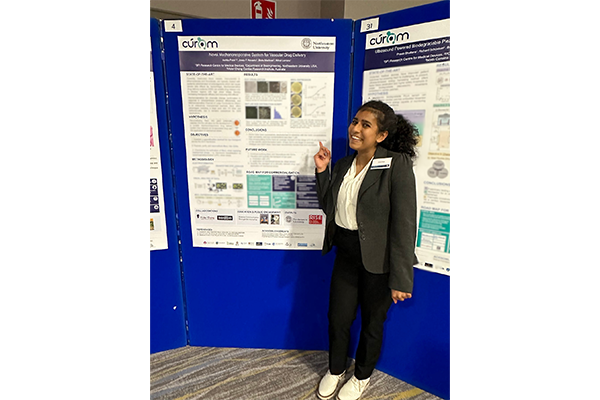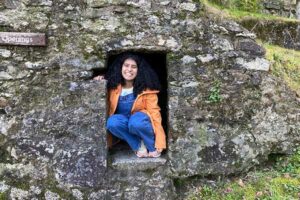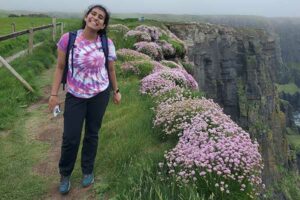Global Co-op Gives Bioengineering Researcher Hope for Equitable Health Care

As she begins her pursuit of a PhD, Ashka Patel, E’24, bioengineering, hopes to use what she has learned on co-op in Boston and beyond to create a more innovative and equitable health care system.
Ashka Patel, E’24, bioengineering, is nearing the end of her time as an undergraduate in Northeastern’s bioengineering program, but her journey has only just begun. Although she graduates in the spring, she is currently applying to PhDs so that when she enters the field, she will be equipped with the skills necessary to make American health care more equitable and diverse.
“I’ve learned that I really enjoy the research process, and my specific goal within bioengineering is to work on the development of medical devices and biomaterials that work to combat health care inequity,” Patel says. “A lot of the devices are designed for [a narrow population] rather than a diverse population, so I hope to combat that through my research.”
Her first co-op in the Traverso Lab at Brigham and Women’s Hospital gave her a taste of bigger-picture concepts like developing research questions and understanding how to respond to the needs of patients.
“That experience was awesome in that it was my first opportunity to actually have a problem and work myself to come up with a solution,” she says.
Working in a lab also gave Patel the chance to engage in hands-on experiences that helped her find answers to her questions. She credits the level of freedom she was given in the Traverso Lab as a game-changer.
“In a lab, there’s less barriers to doing cool things,” Patel says. “Some of the projects I worked on at the Traverso Lab were literally like, I would have a chunk of aluminum and embrittle it with liquid gallium.”
Nearly two years after her co-op ended, Patel still works part-time at Brigham and Women’s as an undergraduate researcher. Needless to say, her first co-op was a success.
Patel’s second co-op took her overseas to the University of Galway in Ireland, where she built upon the skills she acquired at Brigham and Women’s but with a tighter focus. While her first co-op had her handling several different projects in small chunks at a time, her time at the SFI Research Centre for Medical Devices allowed her to devote all her attention to a specific type of research.

Patel explores a castle in Blarney.
“It was really cool to essentially pretend to be a PhD student and work on a project independently with the professor as a resource if I needed,” Patel says.
Patel says that in many ways, life and work at the University of Galway were very similar to the United States. Most of the new perspectives she gained while in Ireland are owed to the people she met in a new work environment.
“A lot of my lab mates weren’t even from Ireland,” Patel says. “They were from all across Europe and Asia, so it’s really cool to be able to learn from people who have different ways of approaching problems.”
Patel has plenty of people to thank who gave her guidance through her research in Ireland, namely her research advisor Mihai Lomora, an assistant professor in biomaterial chemistry at the University of Galway, and Josep Fumadó Navarro, a PhD student who she frequently worked with.
“He was just a really good resource in terms of managing the project and learning these skills,” Patel says.
Patel’s time on co-op has also given her a sure sense of the relationship it has with classes, using co-op as an opportunity to test and expand upon the skills she built in the classroom.
“I learned a lot about designing experiments, what’s important to know, what’s not important to know,” she says. How do I take this tangible problem and come up with a solution to it?”

Patel hikes across the Cliffs of Moher.
Co-op has also helped Patel figure out what she does and doesn’t want to focus her studies on. While she started at Northeastern as a bioengineering and biochemistry major, the opportunity to take on hands-on learning helped her realize that she prefers the mechanical aspect of bioengineering.
Patel says she has co-op to thank for being a gateway to new experiences and perspectives that have guided her as she continues her path towards a PhD. Many of the people she met have served as mentors even outside of work and have been instrumental in navigating the grad school application process.
Beyond co-op, she has kept herself engaged with the Northeastern Society of Women Engineers as the Professional Development Chair and Student Activities Council Representative. She has also mentored fifth graders at Science Club for Girls, an after-school STEM education program in Cambridge aiming to foster a more equitable STEM environment for young girls. Especially through Science Club for Girls, Patel is already working to grow a more diverse biomedical engineering field in any way she can.
“It’s just a really fulfilling experience because you see how excited they are, and you can see that you’re influencing them to get excited about science,” Patel says.
Patel also received the Fung Scholarship and a PEAK Summit Award, both of which funded her global co-op at the University of Galway.
As she prepares to advance to the next level of her studies, Patel sees room for improvement in the American healthcare system, but she feels confident that her co-ops have given her the knowledge and experience necessary to make a difference.
“There’s a lot of room to really address issues that are faced by people who are often marginalized by the American medical system as a whole, so I hope to leverage biomaterials to attempt to address those issues to the best of my capabilities,” Patel says.